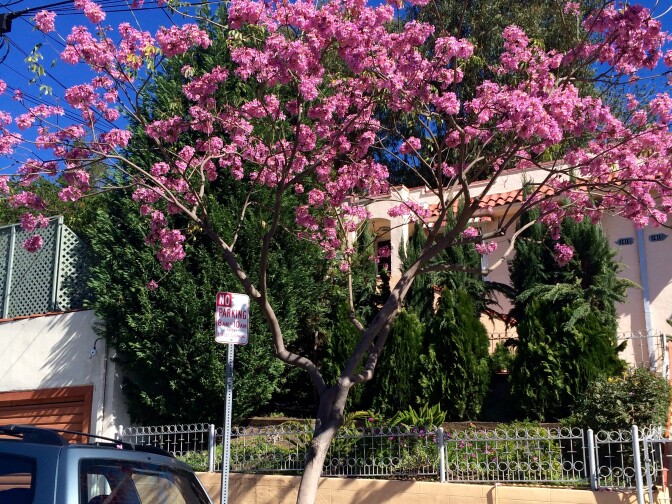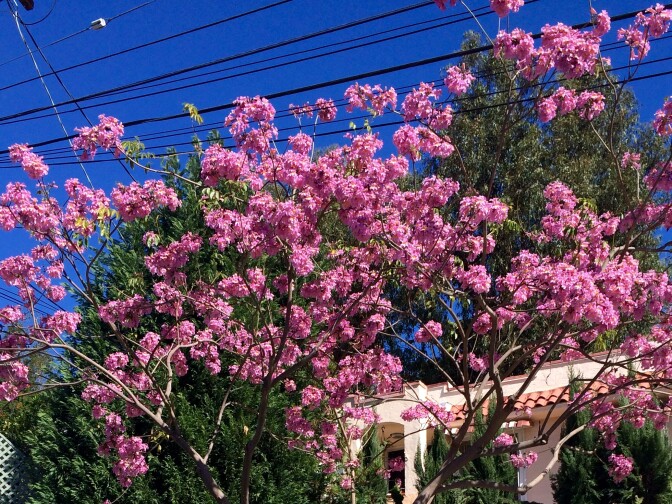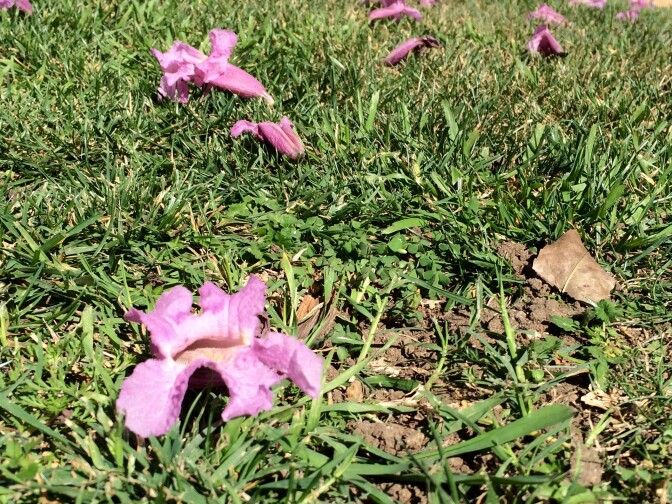This story is free to read because readers choose to support LAist. If you find value in independent local reporting, make a donation to power our newsroom today.
This archival content was originally written for and published on KPCC.org. Keep in mind that links and images may no longer work — and references may be outdated.
#ISeeChange: What the blooming Pink Trumpet Tree on my street means
KPCC and I have been asking you whether you've noticed any changes in your environment, and there’s a good reason why.
By way of explanation, here’s a story: in February on my way out the door I noticed pink blooms on the grassy parkway in front of my neighbor’s house. I noticed them because I didn’t want to step on them. And because they were vibrant pink. And also because it was 85 degrees that Thursday, 17 degrees higher than the historical average. (I didn’t know it was 85, but I sure did notice that my car was hot inside, which is not usually the case in February.)
I stopped, even though I was already late, and I took a picture. And it turns out that I saw something!
The tree I saw was a Pink Trumpet Tree. Its cousins are the national trees of El Salvador and Venezuela; it’s also known as the Lapacho or Tabebuia. The Los Angeles County Arboretum and Botanical Garden helped introduce it widely in the area in the 1970s.
Pink Trumpets typically don't all bloom at the same time. There’s a lot of variability, thanks to how they got introduced in multiple forms and multiple ways. At the same time, I checked older pictures from my street. A February bloom, while I’ve been living there, is unprecedented.
So what does it mean?
That’s the harder part. I can’t tell you that yet. For one thing, I noticed one tree on one day on one street. That’s not enough to make a conclusion about what’s happening with a species more broadly.
And for another, connecting one observation to a more complex phenomenon, like drought, or climate change, is, well, complex:
"You can't pick out just one season or one month or a week and say, 'Oh, this is climate change,'" said Virginia Burkett, chief scientist for the Climate and Land Use Change program at the U.S. Geological Survey. "Generally, you look at records that are at least 30 or more years in length to determine the climate of a certain place."
What we’re asking you to do is simple: look around your natural world, notice whether something looks different than it did before, take a picture of it, add a few words of observation, and share it with us – either directly or on Twitter and Instagram, tagging @KPCC and #ISeeChange.
If you ask us questions about what you’re seeing, we’ll try to find someone who can answer them. If you’re wondering whether Monarch butterflies came early, or why they crowded onto the milkweed in your backyard, we’re wondering that too. We want to get you answers where they exist. And where they don’t – well, after going to law school, I love saying, “It depends.” But we can still tell you what it depends on.
My sister’s a poet, and one of my favorite things she says is, “Nobody can pay attention for you.” What we notice says a lot about who we are, and what we care about. Come notice your environment with us – and stay tuned for more about blooming trees, raptors, salamanders, insects, plants, and your other Southern California neighbors.










